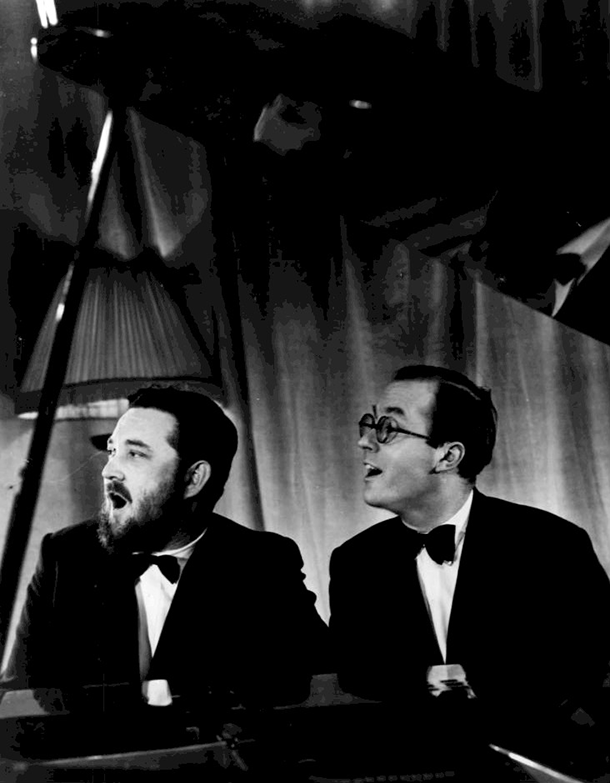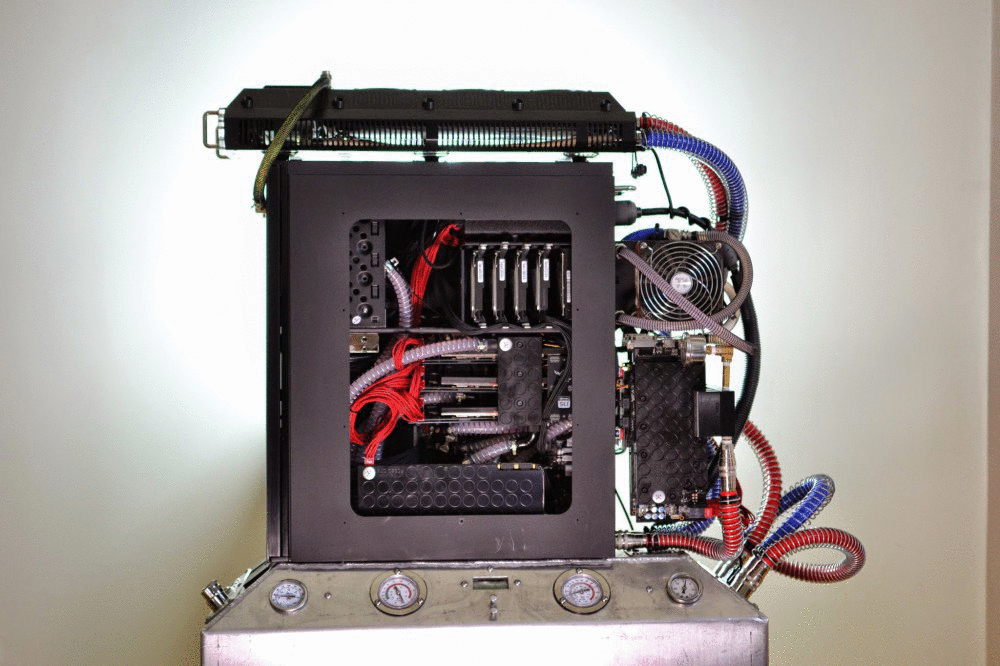Listener Letters and A Fun Lesson on Thermodynamics
Air Date: Week of March 6, 2015

Michael Flanders and Donald Swann are British comedians. (Photo: Bill Doll and Company, New York-publicity agency; Wikimedia commons)
We address your comments on one of our stories, and also revisit the laws of thermodynamics with the British comedy duo Michael Flanders and Donald Swann.
Transcript
[LETTERS THEME MUX]
Time now to hear from you, our listeners.
[MORE THEME]
One of our recent stories elicited a lively exchange. It was an interview with Lawrence Orsini, founder of Project Exergy, a company that is investigating capturing waste heat from computing to heat homes. A lot of you apparently were confused, or even thought we had the science wrong, including John F. Williams who wrote that our interview failed to display “a basic understanding of the science fundamentals,” and thus came across as “magic disguised as science.”
And Frank Gould wrote:
"Of course it makes sense to capture the electrical energy consumed and converted to heat by computers (or any other electrical device) before it is dissipated. But there is such a thing as "conservation of energy". Computers are not going to magically produce more energy than they consume.

Project Exergy's prototype is called Henry (Photo: Project Exergy)
So Lawrence Orsini responded directly to Frank:
You are right, he wrote, that the conservation of energy law cannot be broken, and what we are proposing does not attempt. Instead of running computers just to create heat, our concept is to perform beneficial computation, computation that the house, building, and the world are already using in rapidly increasing quantities. We are hoping to move existing electric consumption associated with computation happening in datacenters to buildings that are consuming energy today just to make heat. This computation-generated heat can DISPLACE energy that the building would otherwise use for one purpose (heat) and instead provide heat AND computation for less energy than datacenters are using today.
Orsini’s colleague John Lilic asserts that there is enough waste heat generated in US data centers to heat two-thirds of the homes in America.
He adds that Datacenters are using a significant portion of the energy they consume to remove heat from the servers using large cooling systems.
The heat we will generate is removed from the computer by serving an existing heat load, so the inefficiency of removing heat from the computing system with air conditioners and chillers is eliminated in our model.
And what about the summer?
Orsini says the same principles behind the technology that is used in propane refrigerators can be used to power air conditioning from waste heat.
So it’s not magic, it’s physics.
And we have had good instruction in the laws of thermodynamics, thanks to the British duo, Michael Flanders and Donald Swann.
[MUSIC: The Cinematic Orchestra--Just One Day, The Crimson Wing: Mystery of the Flamingo, Ninjq Tune 2005]
The First Law of Thermodynamics:
Heat is work and work is heat
Heat is work and work is heat
Very good! The Second Law of Thermodynamics:
Heat cannot of itself pass from one body to a hotter body
Heat cannot of itself pass from one body to a hotter body
Heat won't pass from a cooler to a hotter
Heat won't pass from a cooler to a hotter
You can try it if you like but you'd far better notta
You can try it if you like but you'd far better notta
'Cos the cold in the cooler will get hotter as a rule-a
'Cos the cold in the cooler will get hotter as a rule-a
'Cos the hotter body's heat will pass to the cooler
'Cos the hotter body's heat will pass to the cooler
Good, First Law!
Heat is work and work is heat
And work is heat and heat is work
Heat will pass by…conduction
Heat will pass by…conduction
And heat will pass by…convection
Heat will pass by convection
And heat will pass by…radiation
Heat will pass by…radiation
And that's a physical law!
Heat is work and work's a curse
And all the heat in the Universe
Is gonna cooooool down 'cos it can't increase
Then there'll be no more work and there'll be perfect peace!
Really?
Yeah, that's entropy, man!
And it’s all because of the Second Law of
Thermodynamics, which lays down that…
You can't pass heat from a cooler to a hotter
Try it if you like but you far better notta
'Cos the cold in the cooler will get hotter as a rule-a
'Cos the hotter body's heat will pass to the cooler
Oh you can't pass heat, cooler to a hotter
Try it if you like but you'll only look a fool-a
'Cos the cold in the cooler will get hotter as a rule-a
And that's a physical law!
Oh, I'm hot!
Hot? That's because you've been working!
That's the first and second law of thermodynamics.
CURWOOD: That’s Michael Flanders, with Donald Swann at the piano, explaining the laws of thermodynamics, back in 1964. And remember, your comments on our program are always welcome. Call our listener line anytime at 800-218-9988. That's 800-218-9988. Our e-mail address is comments at LOE.org. That’s comments at LOE.org.
Links
Living on Earth wants to hear from you!
Living on Earth
62 Calef Highway, Suite 212
Lee, NH 03861
Telephone: 617-287-4121
E-mail: comments@loe.org
Newsletter [Click here]
Donate to Living on Earth!
Living on Earth is an independent media program and relies entirely on contributions from listeners and institutions supporting public service. Please donate now to preserve an independent environmental voice.
NewsletterLiving on Earth offers a weekly delivery of the show's rundown to your mailbox. Sign up for our newsletter today!
 Sailors For The Sea: Be the change you want to sea.
Sailors For The Sea: Be the change you want to sea.
 The Grantham Foundation for the Protection of the Environment: Committed to protecting and improving the health of the global environment.
The Grantham Foundation for the Protection of the Environment: Committed to protecting and improving the health of the global environment.
 Contribute to Living on Earth and receive, as our gift to you, an archival print of one of Mark Seth Lender's extraordinary wildlife photographs. Follow the link to see Mark's current collection of photographs.
Contribute to Living on Earth and receive, as our gift to you, an archival print of one of Mark Seth Lender's extraordinary wildlife photographs. Follow the link to see Mark's current collection of photographs.
 Buy a signed copy of Mark Seth Lender's book Smeagull the Seagull & support Living on Earth
Buy a signed copy of Mark Seth Lender's book Smeagull the Seagull & support Living on Earth

